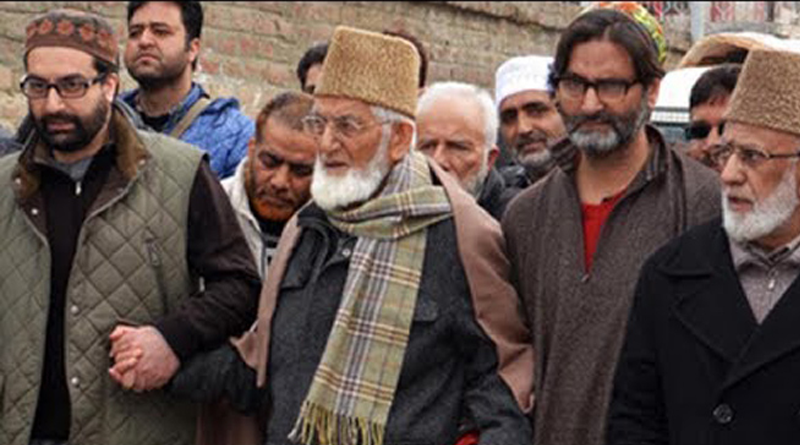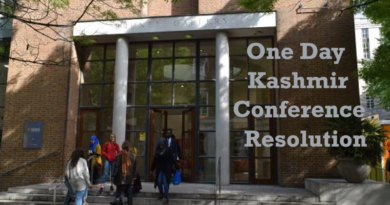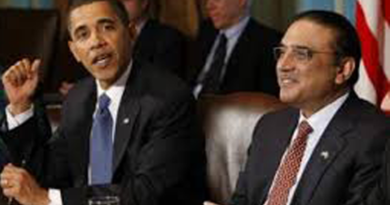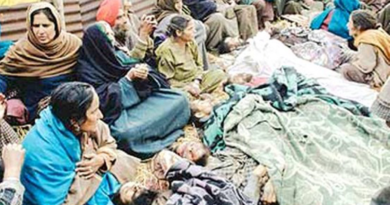A Word to All Freedom-Loving Forces of Kashmir
National Conference’s recent move of passing the so-called autonomy resolution could be easily ignored as a non-event, but what merits attention are the motives behind this futile exercise. Anyone in his or her normal senses will have absolutely no doubts about the fact that the exercise not only had a positive nod from Delhi, but was actually carried out on the behest of it: National Conference (NC) merely obeyed instructions from Delhi, and staged a noisy drama. The question that must be addressed is what is the game plan of the Brahmin establishment in Delhi? After liquidating a full generation of Kashmiri Muslim youth, what is the state of India up to? In the following lines let us look at some possible answers, and in the light of that, our response.
Some reasons as to what prompted NC’s latest move have figured in the press so far. Of these, reasons like NC raking up the autonomy issue to cover up its failures, do not deserve any discussion and should be dismissed forthwith. It has also been said that NC did it to sabotage the dialogue that was allegedly going to take place between Delhi and All Party Hurriet Conference (APHC) of Occupied Kashmir. This again is not true, but deserves a closer look. Two points need to be noted in this regard. First, the statements of APHC leaders, through which they have categorically sought to dispel the impression that they were going to talk to India on some lines similar to the restoration of pre-1953 position. Second and most important point is that this reason is premised on the assumption that APHC and NC are two rival players in Kashmir politics, and India was contemplating to strike a deal with APHC thus practically ditching NC. This cannot be true. It betrays the knowledge of NC’s foundational purpose and function, that make it so indispensable for India. NC was founded for the historical purpose of securing Kashmir for India, and true to that purpose its function has been to ensure India’s grip on Kashmir providing a facade of civil rule to an essentially military stranglehold. Of late, it has been, no doubt, failing in its function, and proving inefficient giving its masters a reason to look for substitutes, but that does not mean it is about to be discarded, it cannot be. First because, it can not be blamed for its failing performance, the historical situation and circumstances are to be held responsible: Islam has emerged as a player in global politics radicalizing Muslim societies all over, and no concrete walls, as some may wish, can be erected to insulate Kashmir, a deeply religious and compassionate society, from this global phenomenon. So it is not NC, anyone in NC’s position will fail. Second reason which I wish I could but cannot discuss in detail for the reasons of space here, is NC’s unique value for India. NC is more than a mere political outfit like for example the Kashmir branch of Congress or of other Indian Parties. It originated as a comprehensive movement, and it represents institutionalized Indian influence in Kashmir at political, ideological, and cultural-religious levels ( I have analyzed NC’s role as an instrument of Hinduization in Kashmir politics in an article published in Greater Kashmir, Srinagar, July 17, 1994) .Since NC was not seen as an extension of an Indian political party, it could successfully manage to absorb people’s cultural, Islamic, and paradoxically anti-India sentiments only to reinforce India’s grip over Kashmir. No other party has been able to render this unique service to India, and that is the reason why every ruling party in Delhi always depended on NC in Kashmir, even at the cost of their own party units there. The last reason why India will not discard NC is more simple: there is no substitute. True NC cannot control Kashmir anymore, but then who can? Some political analysts, looking at the massive boycott of India-imposed elections last year, had come to believe that APHC is better in control of affairs in Kashmir than NC, so why not talk to them and tell them to do India’s job there. In fact, when Indian leaders say from time to time (for example, Chandrashekhar, the interim PM said in 1990) that they want to talk to anyone who can be helpful in bringing ‘normalcy’ to Kashmir they precisely mean that. Whether APHC agrees to such a role, is not the question, suppose, for the sake of argument it does, the real question is, will it remain as it is if and when it agrees. After all, APHC derives all its strength from not being NC, if it becomes one, it will become more impotent than the NC itself. So there is no substitute to NC, and India cannot afford to lose it. If India ever thought of talking to APHC, that would never come about at the cost of NC. Therefore, there is absolutely no truth in this that by bringing up the autonomy issue NC wanted to sabotage a developing APHC-Delhi relationship.
Now returning to the question of how we should look at the recent drama of autonomy, we suggest that it should be viewed as India’s well planned political initiative in Kashmir. The initiative has started with NC’s autonomy debate and resolution, but is likely to include much more in terms of actors, agendas and demands subsequently. Let us briefly look at the context of this initiative. Actually, India has miserably failed in Kashmir, both, on internal as well as external fronts. It has failed to suppress the movement in Kashmir and break the will of people. If one would have to take a barometric reading of where does the will of Kashmiri people after more than a decade of brutal repression stands now, 19 year old martyr Afaq Ahmad Shah would represent the point where the collective will of a terrified and tortured people stands now. The mercury has not come down it has gone up: in the early years of the ongoing movement, it was difficult to find such young men so deeply motivated as to commit such daring acts, as did the young Afaq. Internationally, the story is more pathetic. India has completely failed in its sustained campaign to convince the world that there is no problem in Kashmir. It needs to be pointed out that India’s international campaign regarding Kashmir consisted of two elements, namely,
a) Kashmir is an integral part of India, and there exists nothing such as the Kashmir problem, the issue, and the Freedom Movement; and
b) What is happening in Kashmir is nothing but Pakistan-sponsored terrorism.
The Western world which India mainly sought to convince, accepted the latter part while rejecting the former, and only the men in charge in Delhi can realize how rude a shock it meant to them: they actually wanted the former to be accepted, latter they had created as a justification for the former. The Western world, US in particular, accepted for their own reasons and in the interest of their own political agendas, that terrorism exists—-West labels political Islam as Fundamentalism and Jehad as international terrorism——and also Pakistan may somehow be involved, but it outright rejected India’s position that no Kashmir problem or movement exists, and whatever is happening there is cross-border terrorism. Whenever India brought a case to the court of Western governments—-whether at the time of Kargil, or Indian Airlines Plane hijack in January last—–it was always delivered the same verdict: well, we condemn terrorism, we punish states who support it, but please solve the Kashmir problem, talk to Pakistan and Kashmiris. So India has been coming under some pressure to ‘do something about Kashmir’, and to be honest, it doesn’t have many options left to act otherwise. That however does not mean India has really decided to resolve the Kashmir conflict; it has not, and it is still playing games. For the past some months it has been categorically ruling out talks with Pakistan while at the same time making offers, albeit conditional, to Kashmiris. Why? The more general reason is India’s desire to isolate Pakistan and make it irrelevant in regional politics, and India has been seriously but unsuccessfully pursuing it as a foreign policy objective since its emergence in 1947.The second reason which is more relevant here, is that by excluding Pakistan India wants to distort the nature of Kashmir dispute. Exclusion of Pakistan makes all the difference to Kashmir issue: it strips it of its historical political context and reduces it from an international to internal dispute of India. It becomes a problem of mismanagement of a ‘state’ by the ‘Central government’. Since it has no option but to address the Kashmir problem, India has chosen to address it, but distorted and mutilated. So this basically is the context—-India’s compulsions to make a move for the solution of Kashmir, and at the same time its desire to play games so that the conflict is not resolved—–behind what we call India’s political initiative in Kashmir. The process has just started with NC’s autonomy proposals being sent to Delhi and, as seems most likely, Delhi will enter into a ‘dialogue’ with the NC government on the basis of these proposals. The process will then continue with Delhi asking all other players—pro-India political outfits, as well as APHC plus other groups fighting for freedom—–to enter into dialogue with it. Restoration of pre-1953 position alone will not strictly remain on offer, India can widen this sphere by accommodating the particular agendas and demands of participating groups. Thus a process—-an official Indian peace-process—-will set in, and India will try to co-opt in it as many groups as possible. We need to note two things with regard to this process and that will give us an idea of how this will serve only India’s purpose. First, the present political initiative sets the basic parameters for the whole process, in other words, for all subsequent India’s dealing with Kashmir with reference to ‘solving the problem’. These parameters are set by the very fact that this process was triggered by proposals sent to the ‘central authorities’ from a ‘state government’. Thus, for example, whatever the demands put forth by participating groups, India’s sovereignty over Kashmir (the real and the only issue) will remain non-negotiable. Second, not only that NC would have carved out space for itself in the process, it will be in the vanguard, and that will serve one of India’s vital interests in Kashmir, namely, securing the future of NC in a possible new Kashmir dispensation. It must be pointed out that securing a political future for NC will remain a vital, long term strategic interest for Delhi( even after Kashmir is liberated (Insha-Allah), and it will pursue it up to the last. In post-India Kashmir NC will be of great strategic value to India like Awami League of Bangladesh or MQM of Pakistan.
How should then Freedom loving forces including the APHC react to this move which we call India’s political initiative in Kashmir?
The first thing they must do is to firmly reject it with one voice. They should base their rejection on the total irrelevance of this move to the present movement, rather than the relative demerits of autonomy as compared to other options. India has been making unsuccessful moves like holding elections, installing puppet government before as well, the autonomy move is latest in the series, and it is as irrelevant to the issue, the movement, and the situation of Kashmir as were the earlier ones.
As mentioned above a sort of peace-process may follow the current NC move, and APHC and other groups may be invited to join it at some stage. No freedom loving group should become a part of this process. True, the political leadership of freedom movement may have to sit with Indian leaders at some stage, but they should do so on their own terms. In no way should they compromise on Kashmir being an international issue, indispensably involving Pakistan. Thus the already existing stand of tripartite talks should be strictly adhered to. This cannot be ruled out that at some stage, India will drop the condition of ‘talks within constitution’, and will be prepared to talk without this condition. This is because, on a deeper reflection, the difference will turn out to be hardly more than semantic: India’s Home Minister LK Advani said he is prepared to talk to anyone in Kashmir within the four walls of constitution. APHC included, the whole freedom movement in Kashmir openly rejects accession with India, and is fighting militarily, politically to ‘cede from the union’. The question arises what is the constitutional status of these fighting groups, and when Advani says he is ready to talk to them (instead of arresting them and charging for treason), where does he himself stand? Within the four walls of his constitution or beyond? Actually, these are not fundamental matters, what is very fundamental is the truth that Kashmir is not an internal matter of India. It is a problem that arose in a particular historical-political context where Pakistan, its interest and the question of its very being were directly involved. The dispute, however, did not stop there, the outside world intervened through United Nations, deliberated on this matter and recommended ways to solve it, thus making it an international issue in all senses of the term. India’s effort right from the beginning has been to make it an internal affair and thus put an end to the whole matter. In recent times the Indian government is being advised by its political analysts to at least start talking to its ‘own people. It is a part of the same game—internalisation of Kashmir. All freedom loving forces of Kashmir should outright reject this non-sense. We were never India’s ‘own people (in the sense they talk of it), and suppose we were, do we still remain ‘own people’ of a state whose hands are red with the blood of our thousands? One can only shockingly wonder about the conscience of such a state having the audacity to make such a claim. Last but not least, the freedom movement should reach out to the people and educate them about the real meaning of autonomy. The Indian propaganda machinery is still active in Kashmir, and may try to mislead the people by presenting the idea of autonomy in attractive terms on the basis of ‘something is better than nothing’. The people have to be told and explained that autonomy is not something, it is worse than nothing. We can call a thing ‘something’ when it is a step or even a half step in the right direction. Then we can hope that having covered one step, we can continue the journey later, at least we are one step nearer to the destination. The current move of autonomy is not a step in the right direction.
***
Dr. Syed M Inayatullah Andrabi is a well-known figure in the circles of political Islam. Born in Srinagar, the capital city of Indian Held Kashmir, Dr Andrabi has been intimately involved at the intellectual level with the global politics and political issues since his student days in 1980 at Pune (India), where he completed his Ph.D. in Linguistics in 1983 at the Centre of Advanced Study in Linguistics, Deccan College, University of Pune, Pune, India. Upon completing his doctorate he returned home to join the University of Kashmir, first on a post-doctoral fellowship and later as faculty, but could not continue because of the deteriorating security situation in Kashmir, and had to move to United Kingdom in 1994 where he continues to live since along with his wife and five children.




